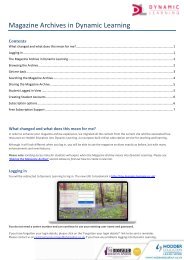POWER
OCR-A-Power-sample-chapter
OCR-A-Power-sample-chapter
You also want an ePaper? Increase the reach of your titles
YUMPU automatically turns print PDFs into web optimized ePapers that Google loves.
ASSESSMENT FOCUS<br />
6.2 The reaction Assessment of the people focus: to British the Reformation<br />
depth study<br />
Aim of the question<br />
The key word here is ‘why’.<br />
Examiners are looking for an<br />
explanation of why the Church<br />
was wealthy. It would be easy<br />
to miss this point and simply<br />
describe how the Church was<br />
wealthy.<br />
How the depth study will be assessed<br />
The depth study on the Reformation will be examined in Paper 3, along with the historic<br />
environment study on castles. The depth study is worth 40 marks, which is 20 per cent<br />
of your total GCSE. You should spend about 45 minutes on this part of the paper. The<br />
questions could be on any part of the content so you need to revise it all.<br />
Uncorrected proof<br />
Question 1 will test the first two assessment objectives:<br />
AO1: knowledge and understanding<br />
• AO2: explanation and analysis.<br />
Question 2 will test AO1 and AO2, but will also test:<br />
• AO3: analyse, evaluate and make use of sources from the time.<br />
Above all, the questions are assessing your ability to think and work like a historian.<br />
In the introduction, you looked at how historians work (page 4). There we set out some<br />
steps that historians take:<br />
1 focus<br />
2 ask questions<br />
3 select<br />
4 organise<br />
5 fine tune.<br />
The exam questions have already chosen a focus (stage 1) and they have asked<br />
questions (stage 2). What the examiner wants from you is stages 3, 4 and 5.<br />
Question 1<br />
Question 1 will ask you to explain an important aspect of the period you have studied.<br />
This may involve explaining the range of reasons for an event or development, or<br />
explaining the scale of the impact of an event or development. For example:<br />
Explain why the Church was wealthy in the early 1530s. (10 marks)<br />
The Question 1 medal ceremony<br />
●<br />
Bronze<br />
●<br />
Silver<br />
(up to 25% of marks): You describe one or more<br />
examples of the role of the Church (e.g. the clergy prayed<br />
for the dead or helped the sick).<br />
(up to 60% of marks): You explain how the Church<br />
became wealthy (e.g. people leaving money in their wills).<br />
●<br />
Gold (up to 100% of marks): You build on the Silver level to make<br />
it clear why the Church became wealthy (e.g. why people left money<br />
to the church in their wills). This will probably involve several reasons.<br />
Even a Gold answer can be improved by ensuring you have:<br />
a clear conclusion that rounds off your argument<br />
• a range of examples as supporting evidence and have included relevant and<br />
detailed knowledge in your supporting examples<br />
•<br />
a balanced answer that shows you understand that there might be more than one<br />
view about the question or explains how the different factors are connected.<br />
185




